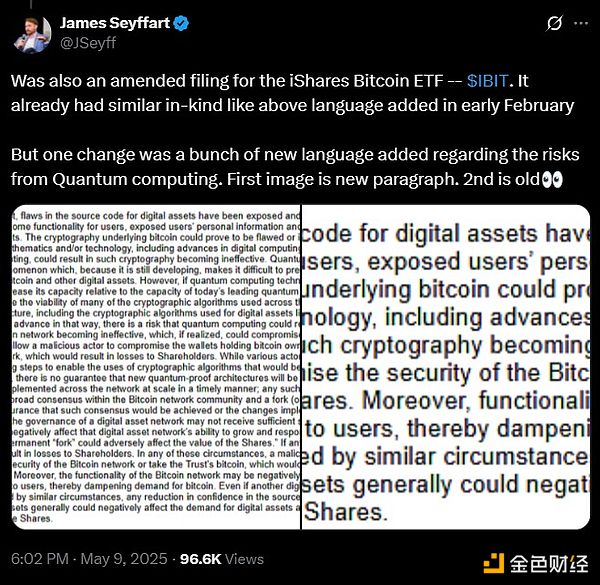Author: Alex O’Donnell, CoinTelegraph; Compiler: Baishui, Golden Finance
Emerging technologies, including quantum computing, could render ineffective the encryption that protects Bitcoin and other blockchain networks, asset management company BlackRock said in a regulatory filing.
On May 9, BlackRock updated the registration statement for its iShares Bitcoin ETF (IBIT). The revision addresses the potential risks posed by quantum computing to the integrity of the Bitcoin network, according to the filing.
BlackRock said: “If quantum computing technology is able to advance [...], it could undermine the viability of many encryption algorithms used in the global information technology infrastructure, including those used for digital assets such as Bitcoin.”
This is the first time the asset management company has explicitly pointed out this risk in its IBIT disclosure. The IBIT ETF is the largest spot bitcoin ETF, with about $64 billion in net assets, according to its website.
Quantum computing is an emerging field that seeks to use the principles of quantum mechanics to dramatically increase the processing power of computers.

Source: James Seyffart/Bloomberg Intelligence
Record Inflows
Risk disclosures like IBIT’s must highlight all the risks an asset could face, even those that are highly unlikely, Bloomberg Intelligence analyst James Seyffart warned.
“They highlight any potential issues that may arise with any product or underlying asset they list. That’s completely standard. And to be honest, it makes perfect sense,” Seifat said in a May 9 X article.
Since launching in January, Bitcoin ETFs have attracted more than $41 billion in net inflows, according to Farside Investors.

On May 8, Bitcoin ETF inflows hit a record high. Source: Eric Balchunas/Bloomberg Intelligence
On May 8, net inflows into Bitcoin ETFs hit an all-time high of about $40 billion, according to Bloomberg Intelligence.
“Historical net inflows are the most important metric in my opinion, and growth is very difficult, to be honest, no exaggeration,” Bloomberg Intelligence analyst Eric Balchunas said in a May 9 X article. “It’s impressive that they were able to hit all-time highs right as the world was about to end.”
In February, Tether CEO Paolo Ardoino predicted that quantum computing would eventually allow hackers to break into inactive Bitcoin wallets and recover those dormant coins.
“Any Bitcoin in a lost wallet, including Satoshi Nakamoto (if he is no longer alive), will be stolen by hackers and put back into circulation,” Ardoino said in a Feb. 8 X article.
 Weatherly
Weatherly






